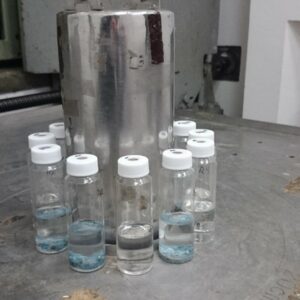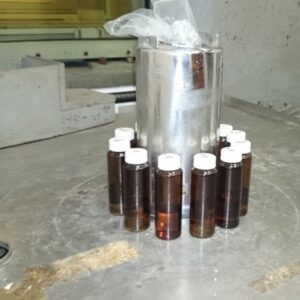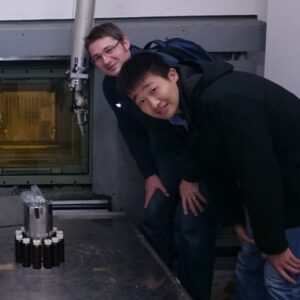Homepage Free
Radical Experiments for Prebiotic Origins
A database of people, resources, knowledge and facilities that study how radicals could have driven life's origins.
People
Find collaborators and design experiments by reaching out to our members.
Facilities
Locate and access radical chemistry experiment facilities near you through our worldwide network.
Chemical Networks
Visualize how radical species can affect entire chemical reaction networks.
WHAT WE DO
We connect people with resources, facilities and each other to investigate how radicals could have driven life's origins
Radicals are chemical species with unpaired outer valence electrons, and they have been intensively studied in disparate fields such as nuclear engineering, cosmochemistry and atmospheric modeling. Radicals can have extreme redox potentials and readily react with non-radical species to quickly diversify a chemical system. For these and other reasons, radicals play a variety of explicit and implicit roles in different origins of life scenarios. REPO was founded to bring together investigators from all over the world, so that we may draw upon decades of perspectives, data, and hands-on experiences with radical chemistry experiment designs.
WHY ARE RADICALS UNIQUE?
Extremely powerful electron potentials
The potentials of radicals can exceed those of very reduced compounds like H2, or very oxidized compounds like O2.
Derived from common chemicals
Water, nitrogen gas, and table salt can all be split to form some of the most powerful and pervasive radical species.
Low or no kinetic barriers
Radicals can participate in reactions, even in near-absolute-zero temperatures found in space.
Form from light (photolysis) or radiation (radiolysis)
UV sunlight, solar flares, radioactive minerals, cosmic rays and planetary magnetic field lines can all drive radical production.
Promiscuous reactivity
Radicals can react readily with a wide variety of organic, inorganic and oranometallic compounds.
Easily form cyclic patterns
Once two radical fragments are generated, they continue to (re)generate new intermediate radicals until recombination.
Drive complex, 'life-like' chemical behaviors
The BZ and RAFT systems are examples of interlinked cycles of radical and non-radical species with non-linear attributes.
Broad compatibility with origins scenarios
Many assumed inputs to different origins of life scenarios are themselves the products of radical synthesis.
REPO AT A GLANCE
A network of radical chemists
The sun never sets on REPO! We are an international organization, and we are committed to increasing membership on every continent. Here we are by the numbers:
35
Active researchers worldwide
120
Manuscripts in our searchable digital library
12
Radiolysis and photolysis experimental facilities
BECOME A MEMBER OF REPO
Register
We invite all who are interested in learning more about radical chemistry to join REPO. Fill out the contact form to begin receiving regular newsletters. Your contact information will not be shared with others, and you will receive no solicitations from us. Our newsletters will only include:
- Summaries of recently published findings
- Overviews of new analytical or experimental techniques
- Research activities of our members
- Upcoming meetings or gatherings
- Highlights of past papers that shape research today
- Radical chemistry in the news
Please also use the contact form if you have specific questions that you think the members of REPO can answer about radical chemistry and the origins of life, or if you wish to contribute in an acknowledged leadership capacity to REPO. Our communications team will respond as quickly as possible to all inquiries.
Contact Us
OUR TEAM
LEADERSHIP

Albert Fahrenbach
Co-Founder

Zach Adam
Co-founder

Betul Kacar
Co-founder
SYSTEMS CHEMISTRY HYPOTHESES
OPEN QUESTIONS IN RADICAL CHEMISTRY
The origins of life is a challenging but important scientific, philosophical, historical and cultural problem. Part of this difficulty lies in the paucity of direct evidence of life's emergence. REPO is committed to advancing the fields of prebiotic chemistry and radical chemistry by articulating and investigating hypotheses that are specific, testable and experimentally tractable.
For this reason, we regularly update hypotheses that connect radical chemistry to the origins of life and openly publish them here. We do this to encourage collaborative experiment design and cross-disciplinary communication. We also do this to emphasize how prebiotic chemical systems powered by radicals may be fundamentally different compared to chemical systems commonly invoked for prebiotic scenarios, such as those driven by redox gradients, pH differences, mineral catalysis or thermal potentials. Our objective is not to exclude or minimize these phenomena, or the decades of knowledge behind them, but to critically assess whether radicals more readily afford unique, systemic behaviors.
Click below to see some of the open questions that REPO members are currently investigating.
RADICALS IN THE NEWS
RECENT COVERAGE OF RADICAL RESEARCH
Much as the sun’s nuclear fusion reactions provide energy to the surface world, a different kind of nuclear process — radioactive decay — can sustain life deep below the surface.
‘By going through a nitrogen radical like we do … we completely change the reactivity of the nitrogen species. Therefore, we can construct these molecules in different ways.’
Since as far back as the 1850s, synthesizing ethers has involved the same fundamental chemistry. Now, researchers from Japan have expanded the synthetic toolkit for ethers—by using cheap reagents and easy procedures.
NEWS & BLOGS
LATEST BLOGS
Titan Tholins: Simulating Titan Organic Chemistry in the Cassini-Huygens Era
Authors: M.L. Cable, S.M. Hörst, R. Hodyss, P.M. Beauchamp, M.A. Smith, P.A. Willis http://dx.doi.org/10.1021/cr200221x
Read MoreFormation of Bioorganic Compounds in Simulated Planetary Atmospheres by High Energy Particles or Photons
https://doi.org/10.1016/s0273-1177(01)00049-7 Various types of organic compounds have been detected in Jupiter, Titan, and cometary coma. It is probable that organic...
Read MoreAmino acid formation induced by high-power laser in CO2/CO-N2-H2O gas mixtures
Authors: S. Civiš, L. Juha, D. Babánková, J. Cvačka, O. Frank, J. Jehlička, B. Králiková, J. Krása, P. Kubát, A....
Read More




